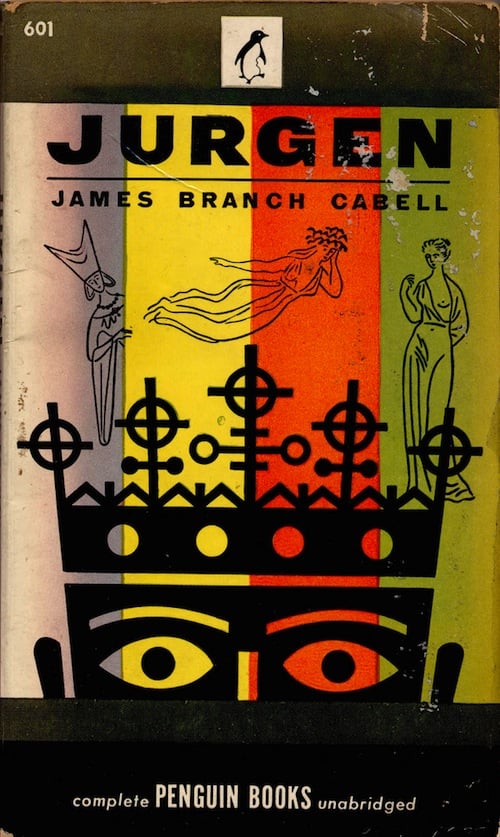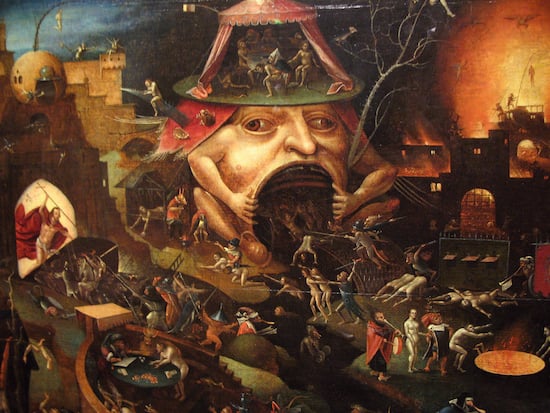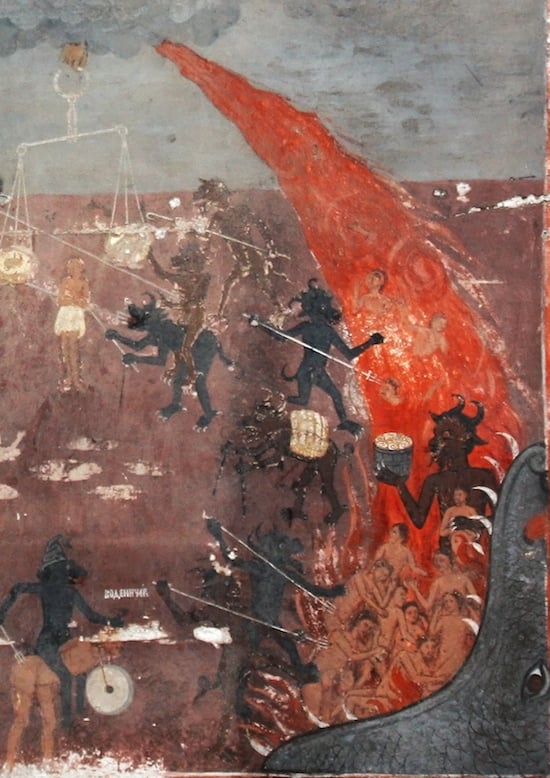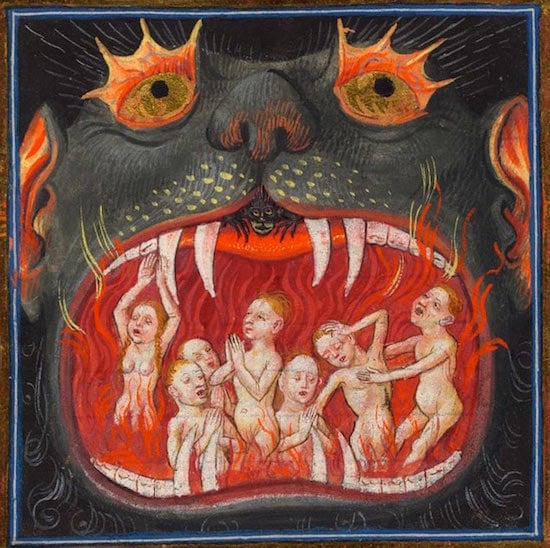Jurgen (39)
By:
December 11, 2015

James Branch Cabell’s 1919 ironic fantasy novel Jurgen, A Comedy of Justice, the protagonist of which seduces women everywhere he travels — including into Arthurian legend and Hell itself — is (according to Aleister Crowley) one of the “epoch-making masterpieces of philosophy.” Cabell’s sardonic inversion of romantic fantasy was postmodernist avant la lettre. HiLoBooks is pleased to serialize Jurgen here at HILOBROW. Enjoy!
Afterward Jurgen abode in Hell, and complied with the customs of that country. And the tale tells that a week or it might be ten days after his meeting with Florimel, Jurgen married her, without being at all hindered by his having three other wives. For the devils, he found, esteemed polygamy, and ranked it above mere skill at torturing the damned, through a literal interpretation of the saying that it is better to marry than to burn.
“And formerly,” they told Jurgen, “you could hardly come across a marriage anywhere that was not hallmarked ‘made in Heaven’: but since we have been at war with Heaven we have quite taken away that trade from our enemies. So you may marry here as much as you like.”
“Why, then,” says Jurgen, “I shall marry in haste, and repeat at leisure. But can one obtain a divorce here?”
“Oh, no,” said they. “We trafficked in them for a while, but we found that all persons who obtained divorces through our industry promptly thanked Heaven they were free at last. In the face of such ingratitude we gave over that profitless trade, and now there is a manufactory, for specialties in men’s clothing, upon the old statutory grounds.”

“But these makeshifts are unsatisfactory, and I wish to know, in confidence, what do you do in Hell when there is no longer any putting up with your wives.”
The devils all blushed. “We would prefer not to tell you,” said they, “for it might get to their ears.”
“Now do I perceive,” said Jurgen, “that Hell is pretty much like any other place.”
So Jurgen and the lovely Vampire were duly married. First Jurgen’s nails were trimmed, and the parings were given to Florimel. A broomstick was laid before them, and they stepped over it. Then Florimel said “Temon!” thrice, and nine times did Jurgen reply “Arigizator!” Afterward the Emperor Jurgen and his bride were given a posset of dudaïm and eruca, and the devils modestly withdrew.
Thereafter Jurgen abode in Hell, and complied with the customs of that country, and was tolerably content for a while. Now Jurgen shared with Florimel that quiet cleft which she had fitted out in imitation of her girlhood home: and they lived in the suburbs of Barathum, very respectably, by the shore of the sea. There was, of course, no water in Hell; indeed the importation of water was forbidden, under severe penalties, in view of its possible use for baptismal purposes: this sea was composed of the blood that had been shed by piety in furthering the kingdom of the Prince of Peace, and was reputed to be the largest ocean in existence. And it explained the nonsensical saying which Jurgen had so often heard, as to Hell’s being paved with good intentions.
“For Epigenes of Rhodes is right, after all,” said Jurgen, “in suggesting a misprint: and the word should be ‘laved’.”
“Why, to be sure, your majesty,” assented Florimel: “ah, but I always said your majesty had remarkable powers of penetration, quite apart from your majesty’s scholarship.”
For Florimel had this cajoling way of speaking. None the less, all vampires have their foibles, and are nourished by the vigor and youth of their lovers. So one morning Florimel complained of being unwell, and attributed it to indigestion.
Jurgen stroked her head meditatively; then he opened his glittering shirt, and displayed what was plain enough to see.
“I am full of vigor and I am young,” said Jurgen, “but my vigor and my youthfulness are of a peculiar sort, and are not wholesome. So let us have no more of your tricks, or you will quite spoil your vacation by being very ill indeed.”
“But I had thought all emperors were human!” said Florimel, in a flutter of blushing penitence, exceedingly pretty to observe.
“Even so, sweetheart, all emperors are not Jurgens,” he replied, magnificently. “Therefore you will find that not every emperor is justly styled the father of his people, or is qualified by nature to wield the sceptre of Noumaria. I trust this lesson will suffice.”
“It will,” said Florimel, with a wry face.
So thereafter they had no further trouble of this sort, and the wound on Jurgen’s breast was soon healed.
And Jurgen kept away from the damned, of course, because he and Florimel were living respectably. They paid a visit to Jurgen’s father, however, very shortly after they were married, because this was the proper thing to do. And Coth was civil enough, for Coth, and voiced a hope that Florimel might have a good influence upon Jurgen and make him worth his salt, but did not pretend to be optimistic. Yet this visit was never returned, because Coth considered his wickedness was too great for him to be spared a moment of torment, and so would not leave his flame.

“And really, your majesty,” said Florimel, “I do not wish for an instant to have the appearance of criticizing your majesty’s relatives. But I do think that your majesty’s father might have called upon us, at least once, particularly after I offered to have a fire made up for him to sit on any time he chose to come. I consider that your majesty’s father assumes somewhat extravagant airs, in the lack of any definite proof as to his having been a bit more wicked than anybody else: and the child-like candor which has always been with me a leading characteristic prevents concealment of my opinion.”
“Oh, it is just his conscience, dear.”
“A conscience is all very well in its place, your majesty; and I, for one, would never have been able to endure the interminable labor of seducing and assassinating so many fine young fellows if my conscience had not assured me that it was all the fault of my sister-in-law. But, even so, there is no sense in letting your conscience make a slave of you: and when conscience reduces your majesty’s father to ignoring the rules of common civility and behaving like a candle-wick, I am sure that matters are being carried too far.”
“And right you are, my dear. However, we do not lack for company. So come now, make yourself fine, and shake the black dog from your back, for we are spending the evening with the Asmodeuses.”
“And will your majesty talk politics again?”
“Oh, I suppose so. They appear to like it.”
“I only wish that I did, your majesty,” observed Florimel, and she yawned by anticipation.
For with the devils Jurgen got on garrulously. The religion of Hell is patriotism, and the government is an enlightened democracy. This contented the devils, and Jurgen had learned long ago never to fall out with either of these codes, without which, as the devils were fond of observing, Hell would not be what it is.
They were, to Jurgen’s finding, simple-minded fiends who allowed themselves to be deplorably overworked by the importunate dead. They got no rest because of the damned, who were such persons as had been saddled with a conscience, and who in consequence demanded interminable torments. And at the time of Jurgen’s coming into Hell political affairs were in a very bad way, because there was a considerable party among the younger devils who were for compounding the age-old war with Heaven, at almost any price, in order to get relief from this unceasing influx of conscientious dead persons in search of torment. For it was well-known that when Satan submitted to be bound in chains there would be no more death: and the annoying immigration would thus be ended. So said the younger devils: and considered Grandfather Satan ought to sacrifice himself for the general welfare.
Then too they pointed out that Satan had been perforce their presiding magistrate ever since the settlement of Hell, because a change of administration is inexpedient in war-time: so that Satan must term after term be re-elected: and of course Satan had been voted absolute power in everything, since this too is customary in wartime. Well, and after the first few thousand years of this the younger devils began to whisper that such government was not ideal democracy.
But their more conservative elders were enraged by these effete and wild new notions, and dealt with their juniors somewhat severely, tearing them into bits and quite destroying them. The elder devils then proceeded to inflict even more startling punishments.
So Grandfather Satan was much vexed, because the laws were being violated everywhere: and a day or two after Jurgen’s advent Satan issued a public appeal to his subjects, that the code of Hell should be better respected. But under a democratic government people do not like to be perpetually bothering about law and order, as one of the older and stronger devils pointed out to Jurgen.
Jurgen drew a serious face, and he stroked his chin. “Why, but look you,” says Jurgen, “in deploring the mob spirit that has been manifesting itself sporadically throughout this country against the advocates of peace and submission to the commands of Heaven and other pro-Celestial propaganda, — and in warning loyal citizenship that such outbursts must be guarded against, as hurtful to the public welfare of Hell, — why, Grandfather Satan should bear in mind that the government, in large measure, holds the remedy of the evil in its own hands.” And Jurgen looked very severely toward Satan.
“Come now,” says Phlegeton, nodding his head, which was like that of a bear, except for his naked long, red ears, inside each of which was a flame like that of a spirit-lamp: “come now, but this young emperor in the fine shirt speaks uncommonly well!”
“So we spoke together in Pandemonium,” said Belial, wistfully, “in the brave days when Pandemonium was newly built and we were all imps together.”
“Yes, his talk is of the old school, than which there is none better. So pray continue, Emperor Jurgen,” cried the elderly devils, “and let us know what you are talking about.”
“Why, merely this,” says Jurgen, and again he looked severely toward Satan: “I tell you that as long as sentimental weakness marks the prosecution of offences in violation of the laws necessitated by war-time conditions; as long as deserved punishment for overt acts of pro-Celestialism is withheld; as long as weak-kneed clemency condones even a suspicion of disloyal thinking: then just so long will a righteously incensed, if now and then misguided patriotism take into its own hands vengeance upon the offenders.”
“But, still —” said Grandfather Satan.
“Ineffectual administration of the law,” continued Jurgen, sternly, “is the true defence of these outbursts: and far more justly deplorable than acts of mob violence is the policy of condonation that furnishes occasion for them. The patriotic people of Hell are not in a temper to be trifled with, now that they are at war. Conviction for offenses against the nation should not be behedged about with technicalities devised for over-refined peacetime jurisprudence. Why, there is no one of you, I am sure, but has at his tongue’s tip the immortal words of Livonius as to this very topic: and so I shall not repeat them. But I fancy you will agree with me that what Livonius says is unanswerable.”
So it was that Jurgen went on at a great rate, and looking always very sternly at Grandfather Satan.
“Yes, yes!” said Satan, wriggling uncomfortably, but still not thinking of Jurgen entirely: “yes, all this is excellent oratory, and not for a moment would I decry the authority of Livonius. And your quotation is uncommonly apropos and all that sort of thing. But with what are you charging me?”
“With sentimental weakness,” retorted Jurgen. “Was it not only yesterday one of the younger devils was brought before you, upon the charge that he had said the climate in Heaven was better than the climate here? And you, sir, Hell’s chief magistrate — you it was who actually asked him if he had ever uttered such a disloyal heresy!”
“Now, but what else was I to do?” said Satan, fidgeting, and swishing his great bushy tail so that it rustled against his horns, and still not really turning his mind from that ancient thought.
“You should have remembered, sir, that a devil whose patriotism is impugned is a devil to be punished; and that there is no time to be prying into irrevelant questions of his guilt or innocence. Otherwise, I take it, you will never have any real democracy in Hell.”
Now Jurgen looked very impressive, and the devils were all cheering him.

“And so,” says Jurgen, “your disgusted hearers were wearied by such frivolous interrogatories, and took the fellow out of your hands, and tore him into particularly small bits. Now I warn you, Grandfather Satan, that it is your duty as a democratic magistrate just so to deal with such offenders first of all, and to ask your silly questions afterward. For what does Rudigernus say outright upon this point? and Zantipher Magnus, too? Why, my dear sir, I ask you plainly, where in the entire history of international jurisprudence will you find any more explicit language than these two employ?”
“Now certainly,” says Satan, with his bleak smile, “you cite very respectable authority: and I shall take your reproof in good part. I will endeavor to be more strict in the future. And you must not blame my laxity too severely, Emperor Jurgen, for it is a long while since any man came living into Hell to instruct us how to manage matters in time of war. No doubt, precisely as you say, we do need a little more severity hereabouts, and would gain by adopting more human methods. Rudigernus, now? — yes, Rudigernus is rather unanswerable, and I concede it frankly. So do you come home and have supper with me, Emperor Jurgen, and we will talk over these things.”
Then Jurgen went off arm in arm with Grandfather Satan, and Jurgen’s erudition and sturdy common-sense were forevermore established among the older and more solid element in Hell. And Satan followed Jurgen’s suggestions, and the threatened rebellion was satisfactorily discouraged, by tearing into very small fragments anybody who grumbled about anything. So that all the subjects of Satan went about smiling broadly all the time at the thought of what might befall them if they seemed dejected. Thus was Hell a happier looking place because of Jurgen’s coming.
Footnotes from Notes on Jurgen (1928), by James P. Cover — with additional comments from the creators of this website; rewritten, in some instances, by HiLoBooks.
* “Temon!” and “Arigizator!” — These words come from a passage cited in John Davenport’s Aphrodisiacs and Anti-Aphrodisiacs. They are given as counters to anti-fertility charms.
* Dudaïm — Dudaïm is a variety of melon, having a small, fragrant, but inedible fruit. It and eruca were supposed to be aphrodisiacs. This is a Hebrew term for the mandrake.
* Eruca — Eruca is a plant of the mustard family. It was once supposed to possess mystic properties. Yet another borrowing from Davenport: “The plant Rocket (brasica eruca) has likewise been especially celebrated by the ancient poets for possessing the virtue of restoring vigour to the sexual organs, on which account it was consecrated to and sown around the statue of Priapus.”
* Epigenes of Rhodes — This was a Greek comic poet, whose works have perished. He was the author of The Bacchic Women.
* Asmodeus — This was the demon of vanity and dress, called, in the Talmud, the king of the devils.
* “The religion of Hell” — The government of Hell, as described in the rest of this chapter, bears a striking likeness to the wartime government of the United States, under Woodrow Wilson.
* Pandemonium — Pandemonium was Milton’s name for the parliament-house of Hell.
* Lin Carter’s Terra Magica appendices suggest that Livonius, Rudigernus, and Zantipher Magnus are fictional.
RADIUM AGE SCIENCE FICTION: “Radium Age” is HILOBROW’s name for the 1904–33 era, which saw the discovery of radioactivity, the revelation that matter itself is constantly in movement — a fitting metaphor for the first decades of the 20th century, during which old scientific, religious, political, and social certainties were shattered. This era also saw the publication of genre-shattering writing by Edgar Rice Burroughs, Sax Rohmer, E.E. “Doc” Smith, Jack London, Arthur Conan Doyle, Aldous Huxley, Olaf Stapledon, Karel Čapek, H.P. Lovecraft, Charlotte Perkins Gilman, Yevgeny Zamyatin, Philip Gordon Wylie, and other pioneers of post-Verne/Wells, pre-Golden Age “science fiction.” More info here.
READ GORGEOUS PAPERBACKS: HiLoBooks has reissued the following 10 obscure but amazing Radium Age science fiction novels in beautiful print editions: Jack London’s The Scarlet Plague, Rudyard Kipling’s With the Night Mail (and “As Easy as A.B.C.”), Arthur Conan Doyle’s The Poison Belt, H. Rider Haggard’s When the World Shook, Edward Shanks’ The People of the Ruins, William Hope Hodgson’s The Night Land, J.D. Beresford’s Goslings, E.V. Odle’s The Clockwork Man, Cicely Hamilton’s Theodore Savage, and Muriel Jaeger’s The Man with Six Senses. For more information, visit the HiLoBooks homepage.
SERIALIZED BY HILOBOOKS: Jack London’s The Scarlet Plague | Rudyard Kipling’s With the Night Mail (and “As Easy as A.B.C.”) | Arthur Conan Doyle’s The Poison Belt | H. Rider Haggard’s When the World Shook | Edward Shanks’ The People of the Ruins | William Hope Hodgson’s The Night Land | J.D. Beresford’s Goslings | E.V. Odle’s The Clockwork Man | Cicely Hamilton’s Theodore Savage | Muriel Jaeger’s The Man With Six Senses | Jack London’s “The Red One” | Philip Francis Nowlan’s Armageddon 2419 A.D. | Homer Eon Flint’s The Devolutionist | W.E.B. DuBois’s “The Comet” | Edgar Rice Burroughs’s The Moon Men | Charlotte Perkins Gilman’s Herland | Sax Rohmer’s “The Zayat Kiss” | Eimar O’Duffy’s King Goshawk and the Birds | Frances Hodgson Burnett’s The Lost Prince | Morley Roberts’s The Fugitives | Helen MacInnes’s The Unconquerable | Geoffrey Household’s Watcher in the Shadows | William Haggard’s The High Wire | Hammond Innes’s Air Bridge | James Branch Cabell’s Jurgen | John Buchan’s “No Man’s Land” | John Russell’s “The Fourth Man” | E.M. Forster’s “The Machine Stops” | John Buchan’s Huntingtower | Arthur Conan Doyle’s When the World Screamed | Victor Bridges’ A Rogue By Compulsion | Jack London’s The Iron Heel | H. De Vere Stacpoole’s The Man Who Lost Himself | P.G. Wodehouse’s Leave It to Psmith | Richard Connell’s “The Most Dangerous Game” | Houdini and Lovecraft’s “Imprisoned with the Pharaohs” | Arthur Conan Doyle’s “The Sussex Vampire.”
ORIGINAL FICTION: HILOBROW has serialized three novels: James Parker’s The Ballad of Cocky The Fox (“a proof-of-concept that serialization can work on the Internet” — The Atlantic); Karinne Keithley Syers’s Linda Linda Linda (which includes original music); and Robert Waldron’s roman à clef The School on the Fens. We also publish original stories and comics. These include: Matthew Battles’s stories “Gita Nova“, “Makes the Man,” “Imago,” “Camera Lucida,” “A Simple Message”, “Children of the Volcano”, “The Gnomon”, “Billable Memories”, “For Provisional Description of Superficial Features”, “The Dogs in the Trees”, “The Sovereignties of Invention”, and “Survivor: The Island of Dr. Moreau”; several of these later appeared in the collection The Sovereignties of Invention | Peggy Nelson’s “Mood Indigo“, “Top Kill Fail“, and “Mercerism” | Annalee Newitz’s “The Great Oxygen Race” | Flourish Klink’s Star Trek fanfic “Conference Comms” | Charlie Mitchell’s “A Fantasy Land” | Charlie Mitchell’s “Sentinels” | Joshua Glenn’s “The Lawless One”, and the mashup story “Zarathustra vs. Swamp Thing” | Adam McGovern and Paolo Leandri’s Idoru Jones comics | John Holbo’s “Sugarplum Squeampunk” | “Another Corporate Death” (1) and “Another Corporate Death” (2) by Mike Fleisch | Kathryn Kuitenbrouwer and Frank Fiorentino’s graphic novel “The Song of Otto” (excerpt) | John Holbo’s graphic novel On Beyond Zarathustra (excerpt) | “Manoj” and “Josh” by Vijay Balakrishnan | “Verge” by Chris Rossi, and his audio novel Low Priority Hero | EPIC WINS: THE ILIAD (1.408-415) by Flourish Klink | EPIC WINS: THE KALEVALA (3.1-278) by James Parker | EPIC WINS: THE ARGONAUTICA (2.815-834) by Joshua Glenn | EPIC WINS: THE MYTH OF THE ELK by Matthew Battles | TROUBLED SUPERHUMAN CONTEST: Charles Pappas, “The Law” | CATASTROPHE CONTEST: Timothy Raymond, “Hem and the Flood” | TELEPATHY CONTEST: Rachel Ellis Adams, “Fatima, Can You Hear Me?” | OIL SPILL CONTEST: A.E. Smith, “Sound Thinking | LITTLE NEMO CAPTION CONTEST: Joe Lyons, “Necronomicon” | SPOOKY-KOOKY CONTEST: Tucker Cummings, “Well Marbled” | INVENT-A-HERO CONTEST: TG Gibbon, “The Firefly” | FANFICTION CONTEST: Lyette Mercier’s “Sex and the Single Superhero”
